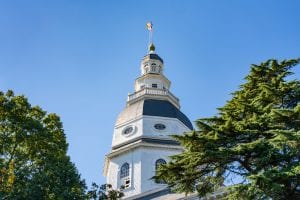
Among the hundreds of bills introduced in the 2021 Session of the Maryland General Assembly is the Community College Collective Bargaining Bill (HB 894/SB 746) which would establish collective bargaining rights for certain Maryland community college employees. In both chambers, the bill is still in the preliminary stages of the legislative process, but as it stands, the bill would dramatically affect labor relations and fiscal discussions in most Maryland counties.
This bill establishes a lightly encumbered collective bargaining process for local community college employees including full-time faculty, part-time faculty, and staff but excluding officers, supervisory or confidential employees, and student assistants. Specified employees may bargain collectively over wages, hours, other terms and conditions of employment, and the procedures for dues to be charged by the exclusive representative. Aspects of access to new employees is also subject to negotiation. Disputes on these issues may be settled through mediation and fact finding and, if necessary, are subject to a final and binding decision by the State Higher Education Labor Relations Board (SHELRB).
The bill’s Fiscal and Policy Note promises that the bill will (1) increase local community college expenditures by an estimated $3 per eligible employee to reimburse SHELRB for collective bargaining expenditures—an estimated total of $36,600; (2) increase local community college administrative and personnel expenditures, including retirement; (3) require some community colleges to hire a labor relations administrator to manage the collective bargaining process at an (very conservatively) estimated cost of $60,000 per year; and (4) increase salary and salary-driven fringe benefits costs by 1% to 3% due to collective bargaining.
Financial burden to community colleges and their respective county looms. The Fiscal and Policy Note suggests that, if counties do not exercise the “option” to fund negotiated terms to a collective bargaining agreement, the college can “choose” to fund the additional costs by raising tuition or spending additional expense to reopen negotiations with the bargaining units.
Some highlights of the current version of the bill include:
- The effective date of the legislation would be October 1, 2021; however, the unions can start organizing prior thereto;
- There is no restriction on the union regarding campaign efforts; however, the public employer is prohibited from expending public funds in conducting a “negative campaign” against a union;
- There is the potential for six distinct bargaining units, each of which can be represented by a union, consisting of (1) full-time faculty, (2) part-time faculty, (3) FLSA exempt non-faculty (with the exception of certain supervisory or confidential employees), (4) the possibility of two distinct units of employees who are not FLSA exempt –e.g., a possible clerical unit and a custodial and maintenance unit; and (5) a unit for sworn police officers;
- The broad sharing of information with unions prior to election or certification annually including, but not limited to “new employee processing”;
- A grievance process over all disputes that may include binding arbitration;
- Union elections may begin as of October 1, 2021 with certifications beginning as soon as October 21, 2021;
- Collective bargaining would need to commence as soon as possible after a union is certified with the aim of concluding negotiations before the College submits its budget to the County;
- The SHELRB will have jurisdiction over binding impasse arbitration proceedings and over all disputes concerning the scope of bargaining and unfair labor practices;
- A negotiated collective bargaining agreement would supersede all existing conflicting college policies and procedures;
- No strikes allowed, but employees would have broad collective action rights.
This legislation would have a significant impact upon community colleges, both in terms of fiscal impact as well as the amount of staff time devoted towards addressing union matters.
PK Law Labor and Employment Attorneys are closely monitoring the bill. Click HERE to contact a PK Law Labor and Employment Attorney or contact information@pklaw.com.
Charles Kassir is an Associate in the firm’s Labor and Employment Group. He graduated magna cum laude from the University of Maryland Francis King Carey School of Law in 2019. While in law school, Charlie served as Executive Articles Editor of the Maryland Law Review and was a Member of the Moot Court Board. After graduating from law school, Charles clerked for the Honorable Joseph M. Getty of the Court of Appeals of Maryland. He can be reached at 410-740-3148 or ckassir@pklaw.com.











